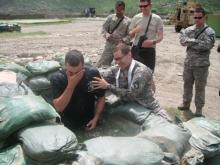US military

EARLY IN THE 2022 NFL season, I watched as the Miami Dolphins quarterback Tua Tagovailoa suffered a second head injury in the span of five days. Although the NFL would not admit the first of those was a concussion, it was painfully clear that Tagovailoa suffered serious brain trauma.
In that moment, I felt the culmination of years’ worth of fretting over the sport I loved and its relationship to head injuries. I determined then and there on a Thursday night that I would quit the NFL. Why? The NFL is violent — and Christians are called to peace.
The league is unrepentant and unaccountable in its abuse of the brains and bodies of its players, and no amount of reform can change that. I am convicted that if I am to love my neighbors — if I am to love God — then I must resist the NFL.

CLINT EASTWOOD has made films about the sorrow and repeating pointlessness of war, as seen through the eyes of both aggressor and aggressed-against, with empathic performances and unbearably moving impact. His American Sniper, about the most lethal sniper in U.S. military history, bloodied in Iraq and struggling at home, is not one of those films. At best it’s a valuable character study of a confused warrior, revealing the traumatic effect of his service. At worst it’s a jingoistic and xenophobic attempt to put varnish on a terrible national response to the horror of 9/11, a response that became a self-inflicted wound creating untold collateral damage.
A decade ago, Eastwood made Flags of Our Fathers and Letters from Iwo Jima, which saw World War II soldiers as propaganda fodder and had the moral imagination to show both sides as courageous and broken without denying the difference between attacker and defender. These films are respectful and thoughtful, but American Sniper is arguably a work born in vengeance. Its reception (becoming one of the biggest January box office weekends ever, and a quick right-wing favorite) is part of the failure to deal in an integrated way with the wounds of 9/11, or to even begin to face the reality of the war in Iraq: an imperial conquest using the cover of national trauma as a justification

Catholic military chaplains cannot be forced to witness or bless a same-sex marriage, nor are they allowed to take part in any marriage counseling retreats that are open to gay couples under new rules issued by the Archdiocese for the Military Services.
The rules, sent to chaplains on Sept. 18 by Archbishop Timothy P. Broglio, head of the AMS, also bar chaplains from taking part in a funeral for a Catholic if that participation “would give the impression that the church approves of same sex ‘marital’ relationships.”
But the new rules also set out conditions that would allow Catholic military commanders to comply, without violating their beliefs, with rules giving same-sex couples under their command federal employee benefits as required by law.

Christian conservatives have grown increasingly alarmed in recent weeks over reports and rumors that the Pentagon is considering new policies aimed at discriminating against Christians and disciplining or even court-martialing those who share their faith.
But the Department of Defense on Thursday sought to debunk that speculation, saying that while aggressive proselytizing is barred, evangelization is still permitted and the rights of all believers – and non-believers – will be protected.
“The U.S. Department of Defense has never and will never single out a particular religious group for persecution or prosecution,” Pentagon spokesman Lt. Cmdr. Nate Christensen said in a statement. “The Department makes reasonable accommodations for all religions and celebrates the religious diversity of our service members.”

Men and women in the military face numerous challenges when they return from combat—whether post-traumatic stress disorder, economic struggles, traumatic brain injury. A glimpse at the headlines tells us the grim statistics of active-duty suicides tied to these issues.
But a new film, The Invisible War, brings to light another staggering reality: a female soldier in a combat zone is more likely to be raped by another soldier than killed in enemy fire.
The Invisible War, which opens in some markets on June 22, takes on the military culture that has failed to address the problem.
Filmmakers Kirby Dick and Amy Ziering collected stories from sexual assault survivors across the country and show how hauntingly similar their the accounts are—from harassment to assault to lack of follow-up, and for some, blatant cover up. The powerful documentary pairs the survivors’ heartbreaking stories with alarming statistics illustrating the scope of the epidemic.
According to the Department of Defense, service members reported nearly 3,200 incidents of sexual assault in 2011.